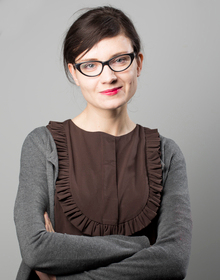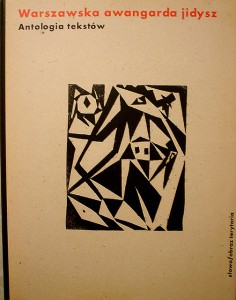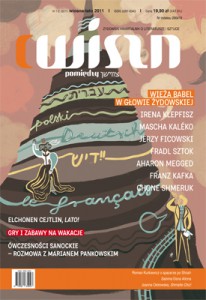The Sun Never Sets on the Yiddish Empire: An Interview with YIVO Fellow Karolina Szymaniak

The recipient of YIVO’s Dina Abramowicz Emerging Scholar Fellowship for 2013-2014, Karolina Szymaniak, is an Assistant Professor at the Jewish Historical Institute in Warsaw, where she also heads the Yiddish Culture Lab. Having earned her Ph.D. in literary and cultural studies from the Jagiellonian University in Kazimierz, Poland, she also works as a researcher and translator in the field of Yiddish. Her research interests include modern Jewish literatures and cultures, the politics of memory, modernism and avant garde, and women’s and translation studies.
She is the editor-in-chief of Cwiszn (Tsvishn), a Polish language quarterly devoted to Yiddish arts and literature. Her book on the Polish-Yiddish modernist writer, Dvoyre Vogel, Przemiany poglądów estetycznych Debory Vogel (Agent of the Eternal Idea: The Changing Aesthetics of Debora Vogel) was published in 2006 in Poland, and she is editor and translator of Warszawska awangrarda jidysz (The Warsaw Yiddish Avant-Garde), a bilingual anthology of avant-garde Yiddish literature and Dialog poetów (Dialogue of Poets), a trilingual volume on Czesław Miłosz’s contacts with Avrom Sutzkever and other Jewish writers.
Entitled "Colonies of Yiddishland? (Ex)territorial Discourses in Yiddish Literary Criticism and the Politics of Modern Yiddish Culture," Dr. Szymaniak’s project for the Dina Abramowicz Emerging Scholar Fellowship considers the complex relationships between language and geopolitical status within the context of Yiddish literary criticism and how Yiddish literature functioned as a diasporic, “exterritorial” cultural discourse.
She was interviewed by Eddy Portnoy.
EP: How did you get involved in Yiddish studies?
KS: When I was in high school I decided that I was going to pursue my studies in a very special framework in an inter-disciplinary studies in the humanities, specializing in Yiddish studies. Yiddish was the language of my family. I knew of Yiddish literature in translation, authors like Peretz and Sholem Aleichem. I grew up in a home with about ten thousand books.
It wasn’t easy to learn Yiddish in Poland. For a long time there was only one Yiddish teacher, Michal Friedman, who taught Yiddish to the actors of the State Theater, and who also a small number of students separately. I also studied with great teachers like Ewa Geller and Eugenia Prokop-Janiec. And now we have Yiddish-related courses in almost every important university in Poland, in literature, culture, theater, film. Back then, when I was starting, there was almost nothing. It was very difficult.
Now Yiddish Studies is really flourishing and I’m on the board of the Polish Association for Yiddish Studies, which has about 70 members, so it’s a lot if you consider that it’s only for Yiddish. There’s a separate organization for Jewish Studies.
EP: You have worked on a number of translation projects. How has the reception of Yiddish literature been in Poland?

KS: What I’m trying to do is transmit, to find a place for Yiddish in Polish history and in Polish academia.
There was a boom in the early nineties, after the fall of communism. People wanted to read what had been forbidden to them, so there was a hunger for it. There were large print runs of writers like Sholem Aleichem and Y.L. Peretz, like 100,000 copies. This has since leveled off. There is still interest, but it’s like any other minor literature. And there is still a little knowledge in Poland about what Yiddish literature is, but mostly it’s about Isaac Bashevis Singer.
What I’m doing with my translation work is introducing the variety and richness of this literature to Poland. My first book was done in 2005 with a group of friends, on avant garde Yiddish literature in Warsaw. It includes things like the literary manifestos of writers like Peretz Markish, Uri Tsvi Grinberg, Henryk Berlewi, Zev Weintraub, as well as their poetry, prose, and visual arts. It’s important to me that Yiddish culture gets to exhibit its aesthetic dimension. If you consider the fact that the first text on abstract film that appeared in Poland was published in Yiddish, that’s something that will change your perspective. I wanted to show that to the audience. It was printed in Polish and Yiddish. I think it was the first bilingual book to appear since 1968. It was a challenge. But now it’s being used in academia and even in some high schools in Poland.

EP: You also combine fantastic visual material with academic and literary material in Cwiszn, the magazine you edit. Tell me about that.
KS: Cwiszn (Tsvishn) is a quarterly about Yiddish and Jewish culture that is funded by the Shalom Foundation and the Polish Ministry of Culture. For the graphics and art, I use students from the Warsaw Academy of Art, among many other places. They contribute to Cwiszn because they know it’s a magazine where they have a lot of freedom to do interesting work. Cwiszn is really a glossy magazine on high quality Yiddish art, culture and literature in Polish. Issues are based on topic and include themes like Yiddish in New York and Israel, Yiddish Schools, Jewish Berlin, and Contemporary Yiddish culture, among others. We try to include a lot of original Yiddish archival material. We also find ways to smuggle in academic material in clever and compelling ways to show the Polish audience what exists in the Yiddish world. We republish articles by American, European and Israeli scholars in Polish and present them in a beautiful, visually arresting way to a Polish audience. Our best seller was about Jewish Feminist body perspectives. I even heard two girls on a tramway talking about it.
EP: What are you working on here at YIVO?
KS: My work here is kind of a sequel to my dissertation, which dealt with discourses of Yiddish literary criticism. This work concentrates on territorial and ex-territorial discourses in Yiddish literary criticism. There is also a component of Polish-Jewish relations that I find interesting. That Yiddish culture looks critically at Polish is a very useful perspective. I’ll be presenting a talk here at YIVO called “Terra Incognita / Black Continent and the Politics of Polish-Yiddish relations.” It also deals with the ways in which Yiddish culture responded to discourses of territorially-based European nationalism. Yiddish is a diasporic culture that provided different responses to these issues. Some of them are territorial, or rather they use territorial language of dominant cultures to define the peculiar situation of a minority, diasporic culture, meaning the very notion has the territorial aspect, “land,” to describe a diasporic culture; and that the language employed is also, sometimes, territorial: there are the capitals, there are colonies, etc., and yes, there are also real spaces, with real places and people, but as a political entity, it is of a more discursive nature and this discourse goes against our speaking habits based on a nation state logic – if we have the capital, we know what it is, we know what is abroad and what is not, were are the borders and how to define them, we can see them on the map etc. Here, everything is more complicated, ambiguous, aporetic even, moving and shifting.
The discourse I’m studying begins in the early 20th century with critic Bal Makhshoves arguing that literature is an ex-territorial product and continues through the late 1930s with Yosef Opatoshu’s famous speech in which he said, “The sun never sets on the Yiddish empire.” All of this can be seen as a type of defense mechanism against the difficult issues Yiddish culture and Jews, among others, were facing.




